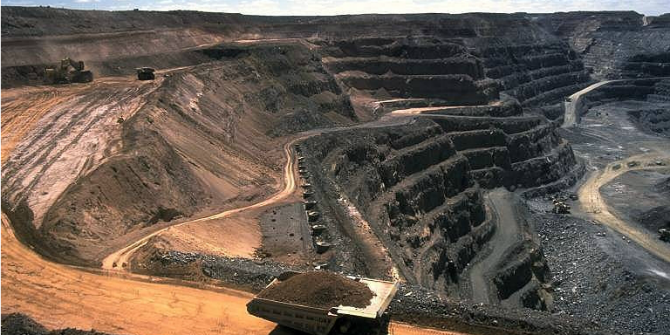 Strip coal mining, by Stephen Codrington, under the Creative Commons Attribution 2.5 Generic licence
Strip coal mining, by Stephen Codrington, under the Creative Commons Attribution 2.5 Generic licence
The election on 8 November of Donald Trump as President of the United States has created great uncertainty about future American policies on energy and climate change. President-Elect Trump has in the past made a number of public statements questioning the existence of climate change, even claiming in a tweet in November 2012 that “The concept of global warming was created by and for the Chinese in order to make U.S. manufacturing non-competitive”.
Earlier this year, he also said that he would try to renegotiate the Paris Agreement if he was elected President, and told The Washington Post that he is “not a great believer in man-made climate change”. However, he provided relatively few details during his Presidential campaign of what specific actions he will take on energy and climate change after he is inaugurated on 20 January 2017. But there are some indications on his campaign website that indicate the likely direction of policy.
Mr Trump published in October a Contract with the American Voter, which presents his “100-day action plan to Make America Great Again”. It includes a promise to “lift the restrictions on the production of US$50 trillion’ worth of job-producing American energy reserves, including shale, oil, natural gas and clean coal”. And it pledges to “cancel billions in payments to U.N. climate change programs and use the money to fix America’s water and environmental infrastructure”.
Among the new legislation that the contract mentions is a “revenue-neutral” American Energy and Infrastructure Act, which “leverages public-private partnerships, and private investments through tax incentives, to spur $1 trillion in infrastructure investment over ten years”.
The two-page contract provides no further details about how these ambitions will be achieved, but his campaign website offers some further information. It outlines an America First Energy Plan that will “make America energy independent, create millions of new jobs, and protect clean air and clean water” and will “conserve our natural habitats, reserves and resources”. It also aims to “unleash an energy revolution that will bring vast new wealth to our country”.
Among the other aims listed in the Plan is to “encourage the use of natural gas and other American energy resources that will both reduce emissions but also reduce the price of energy and increase our economic output”. It is not clear whether “emissions” includes carbon dioxide released by the burning of oil, coal and natural gas, or instead refers only to the escape of methane and other gases during the extraction of fossil fuels.
In addition the plan indicates that Mr Trump will “rescind all job-destroying Obama executive actions”, and “reduce and eliminate all barriers to responsible energy production, creating at least a half million jobs a year, $30 billion in higher wages, and cheaper energy”.
In the pledges on regulation, Mr Trump’s campaign website states that, as President, he will “scrap the EPA’s so-called Clean Power Plan”. The Clean Power Plan was announced by President Obama in August 2015 to reduce greenhouse gas emissions from electricity generation. However, the United States Supreme Court in February 2016 halted implementation pending a judicial review.
Many of these pledges are similar to those included in the Republican Platform 2016, which was adopted in July at the Republican National Convention, where Mr Trump accepted the nomination to be the official candidate for President.
For instance, the platform states:
“We demand an immediate halt to U.S. funding for the U.N.’s Framework Convention on Climate Change (UNFCCC) in accordance with the 1994 Foreign Relations Authorization Act. That law prohibits Washington from giving any money to “any affiliated organization of the United Nations” which grants Palestinians membership as a state. There is no ambiguity in that language. It would be illegal for the President to follow through on his intention to provide millions in funding for the UNFCCC and hundreds of millions for its Green Climate Fund.”
While Mr Trump may indeed be able to stop funding from the United States for the activities of the UNFCCC, as well as its contributions towards the annual flow of climate finance from rich countries to developing nations, he cannot undo the Paris Agreement on climate change. The Agreement came into force on 4 November 2016 after the United States and many other countries ratified it. It would take four years for Mr Trump as President to complete the process of withdrawing the United States from the Agreement.
In addition, Mr Trump may find it more difficult to agree new deals on trade with other countries if he is perceived to be damaging international efforts to limit the risks of dangerous climate change. It has been suggested that Mr Trump may withdraw the United States from the UNFCCC, but this would mean undoing the legacy of George H.W. Bush, who signed up to the treaty as a Republican President in 1992.
Although Mr Trump has previously made negative comments about wind turbines, his campaign promises have not included an end to renewable power generation. It seems unlikely that he will try to prevent states, such as Texas and California, from continuing to increase the use of renewables and other low-carbon energy sources.
It is perhaps surprising that Mr Trump has not made any statements about the fate of the Environmental Protection Agency, which was created by another Republican President, Richard Nixon. The Republican Party Platform 2016 states: “We propose to shift responsibility for environmental regulation to the states and to transform the EPA into an independent bipartisan commission, similar to the Nuclear Regulatory Commission, with structural safeguards against politicized science”.
Mr Trump’s transition team does include Myron Ebell, who has long been an outspoken critic of the agency. He has achieved notoriety for his zealous promotion of unscientific climate change denial.
Mr Ebell is currently employed by for the Competitive Enterprise Institute, a lobby group for ‘free market’ fundamentalist policies. ExxonMobil provided $1.69 million in funding for the Institute between 2001 and 2005, including for lobbying activities on climate change. However, the oil company subsequently stopped its support in 2006 because of the extreme tactics being used by the Institute.
Mr Trump’s energy and climate change policies are likely to lack credibility if they are based on Mr Ebell’s advice.
♣♣♣
Notes:
- This post gives the views of the author, not the position of LSE Business Review or the London School of Economics.
- Before commenting, please read our Comment Policy.
 Bob Ward iis policy and communications director at the Grantham Research Institute on Climate Change and the Environment and the ESRC Centre for Climate Change Economics and Policy at the London School of Economics and Political Science.
Bob Ward iis policy and communications director at the Grantham Research Institute on Climate Change and the Environment and the ESRC Centre for Climate Change Economics and Policy at the London School of Economics and Political Science.




